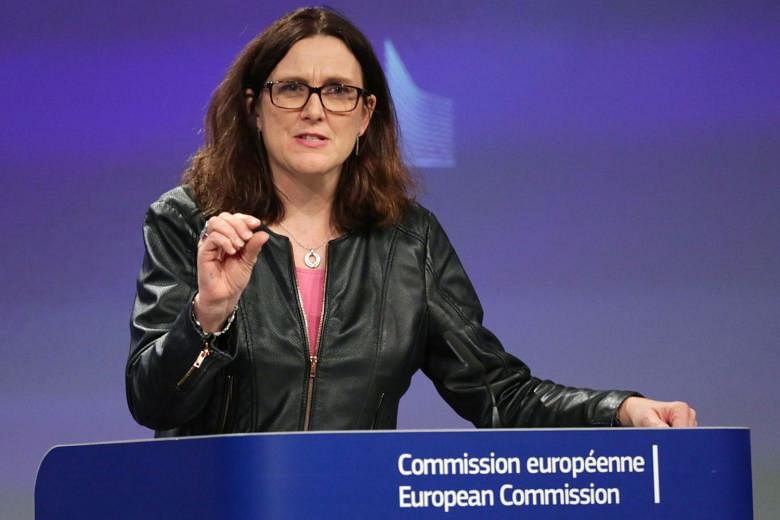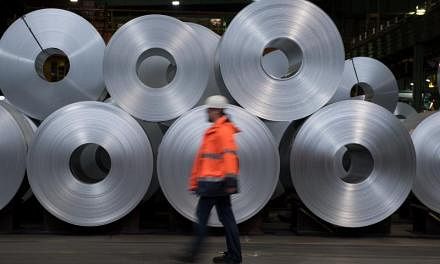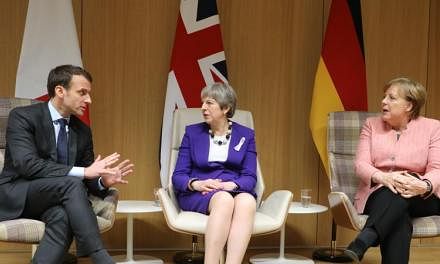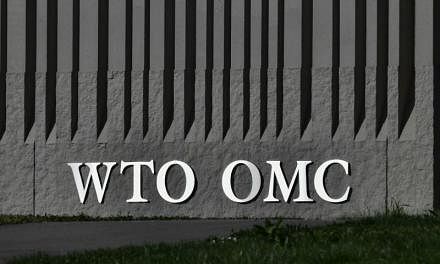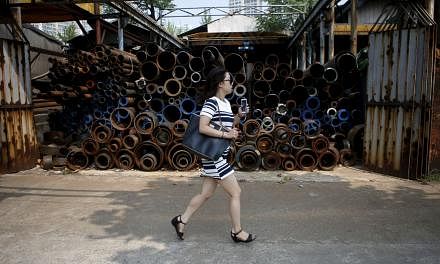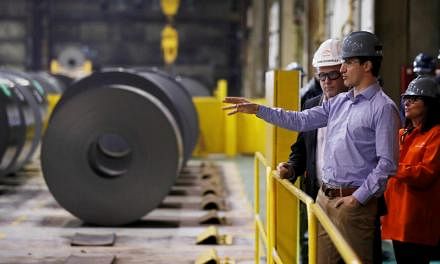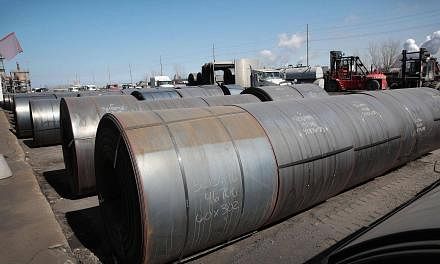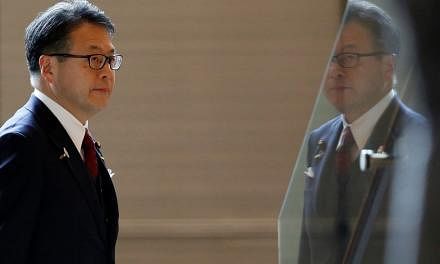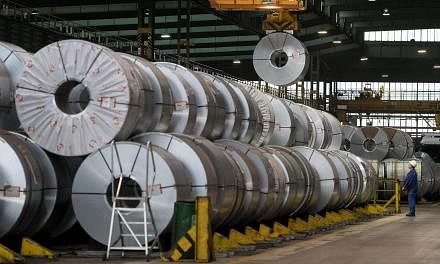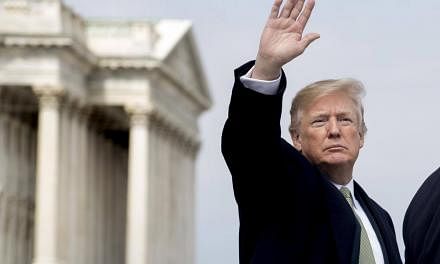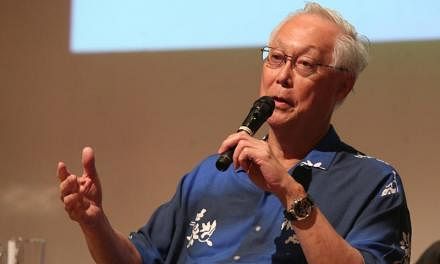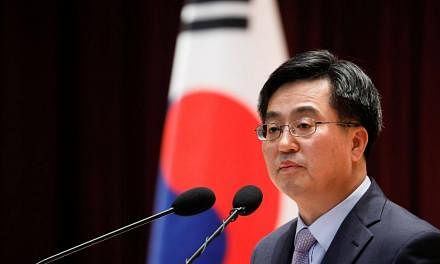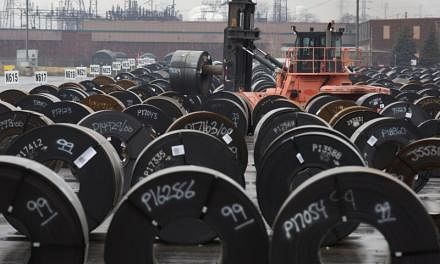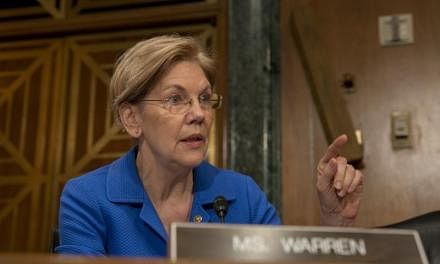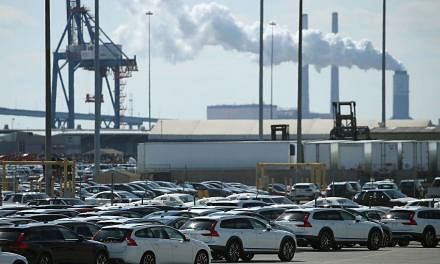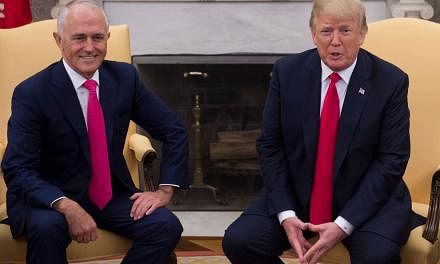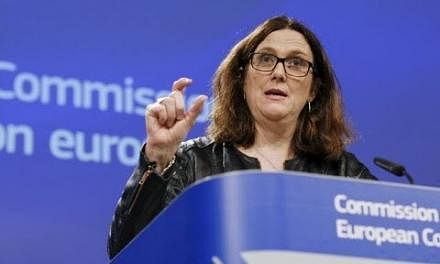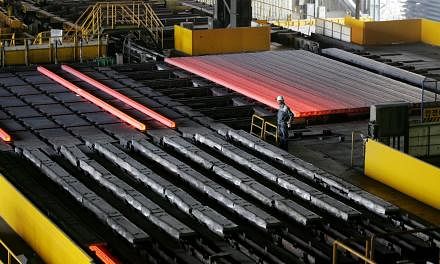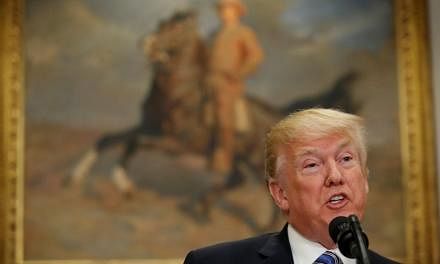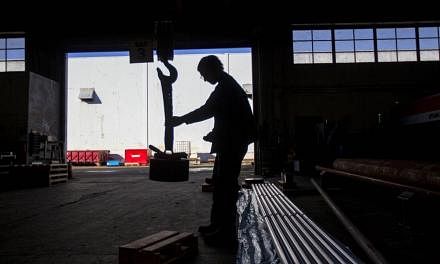BRUSSELS (AFP, REUTERS) - The EU "should be excluded" from new US tariffs on steel and aluminium imports, the bloc's top trade official insisted on Thursday (March 8), saying Brussels would seek urgent clarification from Washington.
Brussels has already drawn up a hitlist of flagship American products to target for countermeasures if its exports are affected by the tariffs signed off by US President Donald Trump on Thursday, Trump imposed the tariffs - 25 per cent on steel and 10 per cent on aluminium - despite repeated warnings from the EU and other allies that this could trigger a full-on trade war.
"The EU is a close ally of the US and we continue to be of the view that the EU should be excluded from these measures," EU Trade Commissioner Cecilia Malmstroem wrote on Twitter.
"I will seek more clarity on this issue in the days to come," she said, adding that she would meet US Trade Representative Robert Lighthizer in Brussels for talks on Saturday.
Announcing the tariffs, Trump said Canada and Mexico would be excluded and other countries could negotiate exemptions, but he singled out Germany for criticism.
The British government said the problem of global over-capacity in steel needed all sides to work together, insisting "tariffs are not the right way" to tackle the issue.
"We will work with EU partners to consider the scope for exemptions outlined today and continue to work with all the sectors involved in this decision to robustly support our industries," the government said a statement.
The EU has threatened retaliatory tariffs on a wide range of US imports items; from steel to peanut butter, bourbon and denim jeans - most of which are produced in states that Trump needs to win reelection.
Europe exports around five billion euros' (US$4 billion) worth of steel and a billion euros' worth of aluminium to the US each year, and the commission estimates Trump's tariffs could cost some 2.8 billion euros.
The EU is also looking at "safeguard" measures to protect its industry - restricting the bloc's imports of steel and aluminium to stop foreign supplies flooding the European market, which is allowed under World Trade Organisation (WTO) rules.
EU President Donald Tusk on Wednesday warned Trump that "trade wars are bad and easy to lose", directly rebuffing the US leader's claim last week they were "good and easy to win".
France said it will assess the impact of the tariffs with its European Union partners and look at how to respond.
"There are only losers in a trade war," French Finance Minister Bruno Le Maire said in a statement on Twitter, adding that France regretted the US announcement.
"With our EU partners, we will assess consequences on our industries and agree (an) appropriate response."
International Monetary Fund Managing Director Christine Lagarde said on Thursday she feared a "tit-for-tat" escalation of trade retaliation over Trump's tariffs that would sap business confidence and investment.
Lagarde, speaking at a Washington Post forum on women's issues, said it was not the direct economic impact from the tariffs that concerned her most, but its role as a "trigger" for retaliatory responses from trading partners worldwide.
"It is that escalation that is in and of itself dangerous for the impact that it has on all those economies, and furthermore for the impact that it has on confidence," Lagarde said, noting that trade has been an engine of growth that has fuelled a stronger global recovery in recent months.
"And confidence is a super-precious good that builds over time and can be destroyed very quickly," Lagarde said. "If the perception of investors around the world is that this is uncertain, and you never know where the tariffs are going to go, how high, how low, against whom ... then you step back and you don't invest, you wait and that confidence impact could be significant."
Canada on Thursday hailed the news it would not immediately be subject to US tariffs on steel and aluminum while promising to continue lobbying Washington until the threat of duties had disappeared.
Trump said Canada and Mexico would be exempt from tariffs as long as talks to update the North American Free Trade Agreement (Nafta) trade deal progressed.
"Today is a step forward. There's more hard work to do, and we will not let up," said Canadian Foreign Minister Chrystia Freeland, who led what officials called an aggressive lobbying campaign to persuade Trump to grant an exemption.
Freeland, speaking in Toronto, also told reporters that "this work continues and it will continue until the prospect of these duties is fully and permanently lifted".
Pressed repeatedly about Trump's decision to link the tariff exemption to progress at the talks on Nafta, which are going slowly amid US demands for major changes, Freeland said Canada considered the two tracks to be totally separate.
Canada is the largest supplier of both steel and aluminium to the United States.
Mexico's economy ministry said in a statement on Thursday that talks to revamp Nafta should not be subject to outside pressure and will proceed independent of Trump's tariff policy.
"The process to negotiate a modernized NAFTA continues its course, independent of the (metal tariffs) or any other internal policy measure that the government of the United States takes," the Mexican statement said.
The statement doubled-down on similar comments earlier on Thursday that Economy Minister Ildefonso Guajardo made prior to Trump's announcement.
Brazil, the second largest steel supplier to the United States, said on Thursday it would take "all necessary actions" in bilateral and multilateral forums to preserve its interests after the imposition of US tariffs on steel and aluminum imports.
The measures will strongly hamper Brazilian exports and are incompatible with US obligations toward the World Trade Organization, the country's Foreign and Trade Ministries said in a joint statement.
"Brazil reaffirms that it will resort to all necessary actions, bilateral and multilateral, to preserve its rights and interests," the statement added.
A senior Foreign Ministry official said Trump's "unprecedented" decision had put trade relations between the United States and Brazil in "unchartered waters"that could even lead to retaliation by the Brazilian government.
"Nothing is off the table," said the official, who asked not to be identified because of the sensitivity of the matter. The tariffs will potentially have a "severe impact" on Brazilian steel exports to the United States, which are mainly semi-finished products that make up 13 percent of U.S. steel imports, the official said.
"All suppliers will be affected and we do not know if the Brazilian companies will be able to export anymore to the United States or compete, with such tariffs," he said.
Argentina said it will seek to join Mexico and Canada in getting an exemption from the US tariffs.
"Trump affirmed that others could receive this privilege, through a process that will be announced shortly," the country's Foreign Ministry said in a statement, noting that Argentina accounted for just 0.6 per cent of US steel imports and 2.3 per cent of its aluminium imports.
"Argentina is not the cause of nor does it contribute to the distortions that affect US and world markets."
Aluar Aluminio Argentino, Argentina's sole primary aluminum producer, which is 10 per cent state-owned, asked the US Commerce Department last year to exempt it from any adverse measures implemented after its investigation into the national security impacts of imports of the metal.
